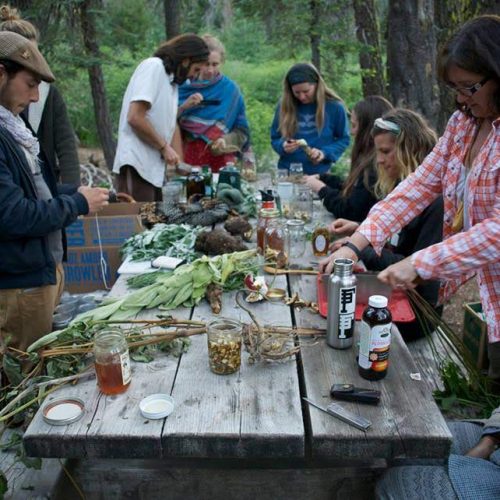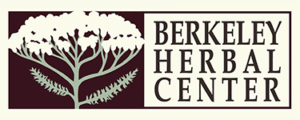
Berkeley Herbal Center has been operational for more than 25 years. We have literally played a hand in creating a generation of herbalists and we have spread Western herbalism all around the world.
Sure, every herbalist that graduates from our school is a little bit different – they utilize different healing modalities, have different focal points, and use different herbal allies in their formulas.
We do have one thing in common. Someone(s) our community will always ask: What does an herbalist actually do?
This is a great question to ask, because going to an herbalist is not like going to the doctor. It’s a lot more hands on, a lot more preventative, and it’s more connected to health giving than sickness abating. Scheduling a visit to see their herbalist is something everyone should be doing more often than just when you get sick.
Remember that your herbalist is dedicated to helping you to heal yourself. The human body, mind, and spirit is very well equipped to reach a level of balance and optimal health, but sometimes it needs a boost.
While herbalists can help throughout illness, they are also trained to see potential health issues before they arise, and help you work through them before they become a much more serious issue.
Typically, at the beginning of your first herbal consultation, you’ll fill out a pretty detailed intake form so your herbalist can look at physical, mental, and metaphysical aspects of your health to get a full, holistic picture of your life and begin to help you heal yourself.
The goal of a Western herbalist is to peel back the layers of who you are and take a holistic approach to helping you feel that you are living a healthy, fulfilled life.
Physical health is typically just what you would see a doctor for – you can tell us about your pains and sicknesses, we will collect your health history and ask for information about your family. So much of how we think, feel, and act happens through our physical body, so your herbalist will always start with a few key concepts.
An herbalist will also work to get a good idea of your diet. They might even ask you to complete a food-mood diary for a few days to get an idea of what could be going on with your diet that could cause illness – or may be causing issues now.
Your diet is one of the most important things your herbalist will look at. What we put into our bodies has a direct effect on what happens to our health.
They also want to know about your physical lifestyle – how much do you exercise, how much sex do you have and how often, if you work on your feet or in front of a computer screen etc. These questions give them a pretty good overview of your day to day habits. It gives the herbalists more information to offer you insight into simple lifestyle changes that can drastically improve your health.
Herbalists view each day as a 24 hour cycle – not just as separate waking and sleeping cycles because the entire 24 hour cycle has an impact on your health. Getting regular sleep is vital for normal brain function, balancing sugar levels, natural immunity, and being able to operate normally day to day. If you have issues with sleep, your herbalist will talk to you about your waking hour activities and help you find a full 24 hour cycle that will serve your health.
Your herbalist will want to know things like, how much sun you get, where you spend most of your time, and how often you change your physical environment. The physical environment you find yourself in has an impact on how you live your day to day, even if it might not be altogether clear to you how.
When it comes to having a healthy, happy, body, your emotional wellbeing is just as important as your physical health. Not only do they have a separate impact on your overall health, but they actually impact each other a ton.
If you’re happy, you’re more likely to feel physically well – and if you’re physically well, you’re more likely to feel emotionally stable. The reverse is also true. Sickness of the mind absolutely leads to sickness in the body. So your herbalist will also talk with you and ask you questions about these things
This is a big deal – and it’s so intimately tied to your physical being that it could easily be in that section of this article. The way you handle emotional stressors in your life has a direct impact on your physical being. Some stress is good, but when it gets to be too much, your physical body will begin to deteriorate too.
Your working life, the stress that you take on from friends and family, the self-applied pressures, and societal stressors are all important to take note of. Since stress is such a big part of our life and health in our society, it’s likely that your herbalist will be particularly interested in this – especially when it comes to building you a formula.
This is one of the most important relationships that we can have. It impacts everything from your relationships with other people to your sleep to your diet and every single part of your lifestyle. If you’re struggling with the person in the mirror, your herbalist needs to know so that they can help provide a safe place for your journey.
Do you have a significant other? Do you have friends? How close are you with your family? Relationships can seriously impact your health, positively and negatively, so to get a holistic picture of who you are and what you need, your herbalist will ask questions about the health of your most intimate relationships.
Are you involved with your community? Are you taking steps to find activities that you like with people you don’t know? Community involvement is a big part of how we interact socially, so it’s important to let your herbalist in on this aspect of your wellbeing. She’ll be able to help give you resources or ideas within your community.
Metaphysics are parts of you that we’re not able to see, but that play an important role in your overall well being. Your herbalist will likely touch on these things as well when they ask questions, but they’re also equipped to look for specific signs within this type of environment.
Your herbalist will be able to asses the health of your qi, your internal fire, your spirit. A loss of vital spirit energies can come cause a whole slew of issues, and that can set you up for a long battle with physical and mental unrest. Your herbalist knows what to look for, and they’re trained in how to help someone find their soul spark.
Like stress, the dreams you have can fall into just about every category. Do our dreams come from our physical sleep cycle, are they related to our emotional wellbeing, or do they connect us to metaphysical truths that we have to decipher? Probably all of the above. The dreams you have can offer insight into fears, goals, or feelings that you haven’t connected with yet. Sharing these with your herbalist – or even sharing if you don’t dream at all – can help guide them towards the right formula for you.
The animals that you connect with, and don’t connect with, resonate different types of energies. Being able to pick up on what animals walk with you – in the waking realm and the dreaming realms – can help to share a bit about your metaphysical energy and health. If you’re not in tune with your animal side, that’s relevant for your herbalist too.
After your initial consultation, your herbalist is loaded with all of the data from your intake form, along with the information you gave and the observations they have made of you. Using that all of that information, your herbalist is going to work with you to make a plan to help you reach the goals you have for your health and body.
Western herbalists have an extensive knowledge of how the body works, how the organs connect to one another, and how the body, mind and spirit help you function as a holistic being. They train in multiple modalities and they learn to research allopathic medicines and testing techniques along with traditional herbal medicine healing passed down from our human ancestors.
So, that’s what an herbalist does. It’s complex and unique – but the healing that can come from building a relationship with the right herbalist for you is unparalleled.
Have you scheduled an appointment with an herbalist lately? Send us an email to clinic@berkeleyherbalcenter.org to set up an appointment.
Support Our Work
Berkeley Herbal Center is a 501(c)(3) organization, so all donations are tax deductible. Tax ID #14-1975183
If you would like to donate by check or cash, please send an envelope addressed to:
Berkeley Herbal Center
1250 Addison St., #G
Berkeley, CA 94702

